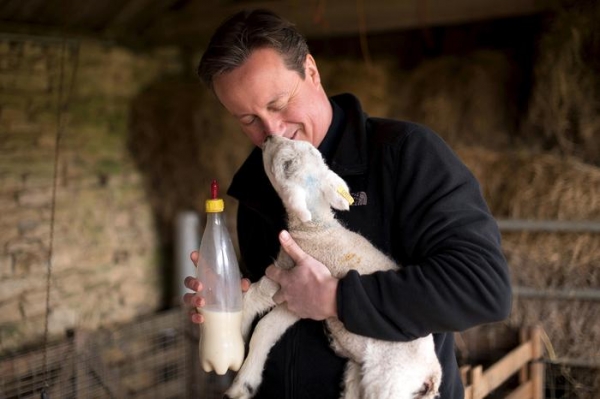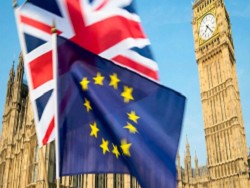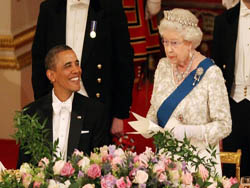Following the news that UK residents don’t want to be part of the European Union, on his resignation said David Cameron. RT recalls the memorable Prime Minister.

Having driven in may 2010, a residence at Downing street 10 after winning the General election, the 43-year-old conservative leader David Cameron became the youngest Prime Minister of the United Kingdom since 1812. His Cabinet, which included several liberal Democrats, became the first coalition government of great Britain after the Second world war.
From the very beginning of his Premiership, Cameron showed himself to be a pragmatist-neoliberal aims to update the traditional values of conservative ideology for what it called “the liberal democratic sheep led by the wolves-Tory” and even “Pol pot, intended to destroy the very memory of Thatcherism”. “He did what especially does not believe, he only believes in himself” — he described Cameron as one of his party colleagues Philip Oppenheim, almost literally repeating the words of John Galsworthy about the English national character.

Soon after the parliamentary election, Cameron’s government has begun implementing austerity programs, mainly by reducing the expenditure side of the budget. In particular, the triple (₤3000 to ₤9000 per year) was increased to the maximum tuition fees in universities, and public funding of the institutions themselves of higher education is significantly reduced. In addition, from 17.5% to 20% was increased VAT.
In February 2011, speaking at the Munich security conference, Cameron acknowledged the failure of multiculturalism. He noted that European countries are forced to endure “a segregated community that does not share our values.” In his opinion, the solution is to “muscular liberalism”: the development of national identity, which could prevent the radicalization of young people, primarily Muslim.
On the wave of mass protests against the rule of Muammar Gaddafi Cameron has supported the idea of introducing in the skies over Libya no-fly space.” In March 2011, the UK armed forces joined the military operation in this country, which is already involving the United States and France. In April of the same year Cameron, French President Nicolas Sarkozy and U.S. President Barack Obama issued a joint statement, which recognized the “unthinkable” future Libya led by Gaddafi.
When in August 2011 in British cities were the largest riots, accompanied by looting and clashes with police, Cameron said on the necessity of criminal punishment for the rioters and their eviction along with their families from social housing.
In September 2011 Cameron visited Moscow where he held talks with then-Russian President Dmitry Medvedev. Speaking to students at Moscow state University, he stressed that “Russia and Britain are stronger when they are together.” During the visit, agreements were signed on cooperation between Rosatom and Rolls-Royce Corporation, SKOLKOVO Foundation, and scientific centers of great Britain. The parties acknowledged that the controversy over the assassination of former FSB officer Alexander Litvinenko and the cooperation of intelligence agencies of the two countries in extradition are maintained.

In December of 2011 at the EU summit in Brussels, Cameron demanded to make the UK the exceptions proposed by Germany and France mechanisms of financial regulation. After other leaders of the summit have refused to give London the opportunity to participate in certain provisions of the new Treaty, the British Prime Minister has rejected it completely.
In August 2012, during the London Olympics, Downing street and held talks with Cameron and Russian President Vladimir Putin. They discussed the situation in Syria, as well as issues of security and trade.
The British Prime Minister, in particular, expressed concern about the offensive of the troops of Bashar al-Assad in Aleppo on areas under opposition control.
In September 2012, Cameron was unable to answer basic questions of American TV presenter David Letterman on British history. The Prime Minister did not know who wrote the Patriotic song “Rule, Britannia, seas!” and translated into English from the Latin Magna Carta — “Magna Carta”.
In January 2013 Cameron first declared his intention to hold a referendum on EU membership if the election in 2015 the Conservative party will win. However, he underlined that he is not for the collapse of the European Union, and for its reform.
In may 2013 Cameron and Putin met in Sochi. They made a helicopter trip to explore the Olympic Park and discussed the Syrian crisis. The rating of the TV company BBC, these talks were the most positive meeting between the heads of the two States for the last 7 years. “Our main goals are the same: we want to put an end to the conflict, to prevent the collapse of Syria, let the Syrian people to choose their own leadership and to prevent the spread of extremism,” said Cameron at a press conference following the talks.
“Our main goals are the same: we want to put an end to the conflict, to prevent the collapse of Syria, let the Syrian people to choose their own leadership and to prevent the spread of extremism – David Cameron
In June 2014, the Russian and British leaders held talks in the Paris airport Charles-de-Gaulle. Observers noted that the meeting began without the traditional handshake. A few hours earlier, after the G7 summit in Brussels, Cameron accused Russia of “unacceptable destabilization of the situation in Ukraine has asked Putin to recognize Petro Poroshenko as the President and to stop supporting militias in the South-East.
In July 2014, Cameron published in the newspaper The Sunday Times article with a call to tighten sanctions against Russia if she would not cooperate in the investigation of the death of a Malaysian airliner in Donbass. The British Prime Minister, “if President Putin does not change his approach to Ukraine, then Europe and the West must fundamentally change their attitude to Russia”.
In November 2014, Cameron and Putin held a bilateral meeting on the sidelines of the G-20 summit in Brisbane. According to the press Secretary of Russian President Dmitry Peskov, the issue of Ukraine “was actually only” in the course of the conversation.
According to the results of the parliamentary elections on 7 may 2015, the Conservative party won an absolute majority in the house of Commons, and Cameron formed a single-party government. Included in the previous Cabinet, the liberal Democrats lost 57 seats, and their leader, Deputy Prime Minister Nick Clegg, resigned. The provision on the referendum on EU membership was included in the program of the new government. A month later, the overwhelming majority of MPs voted for the plebiscite.
In January 2016, Cameron, commenting on published in London a report on the poisoning of Alexander Litvinenko, said that his country is ready to impose new sanctions against Russia. He added that further cooperation with Russia in this question should be “eyes and cold heart.”
In February 2016 at the summit in Brussels, Cameron failed to agree on a package of measures to reform the EU, securing the UK a special status in the organization. In particular, he defended the right of London to pursue an independent monetary policy and to provide financial assistance to States that is used for the calculations Euro. The UK also received the right to freeze welfare benefits to migrant workers from EU countries.
In April 2016 Cameron after the talks with Barack Obama stressed that the UK plays a key role in making anti-Russian sanctions of the European Union. “I’m not sure that this would have happened if we were not in the EU,” he said.
In may 2016, campaigning against breccia, Cameron said that Russian President Vladimir Putin “can rejoice, if Britain leaves the EU.”







